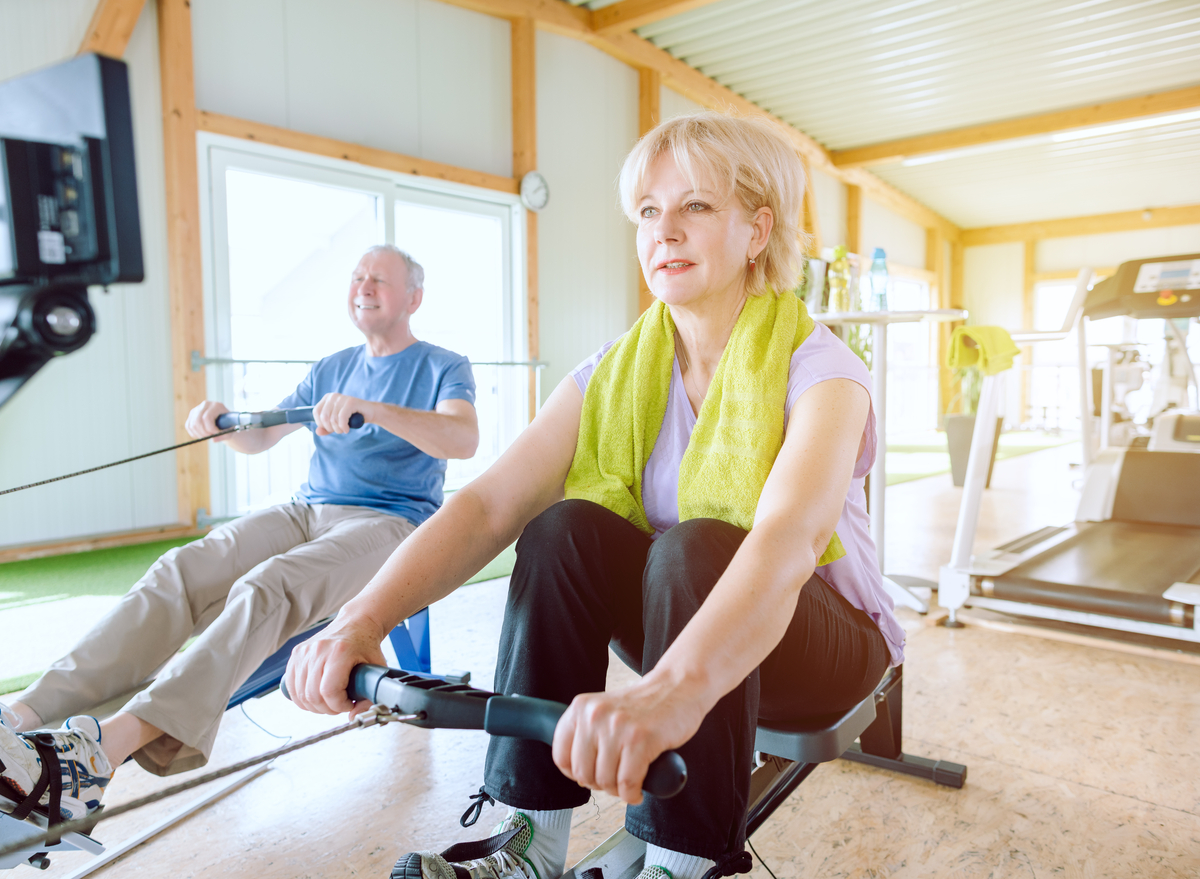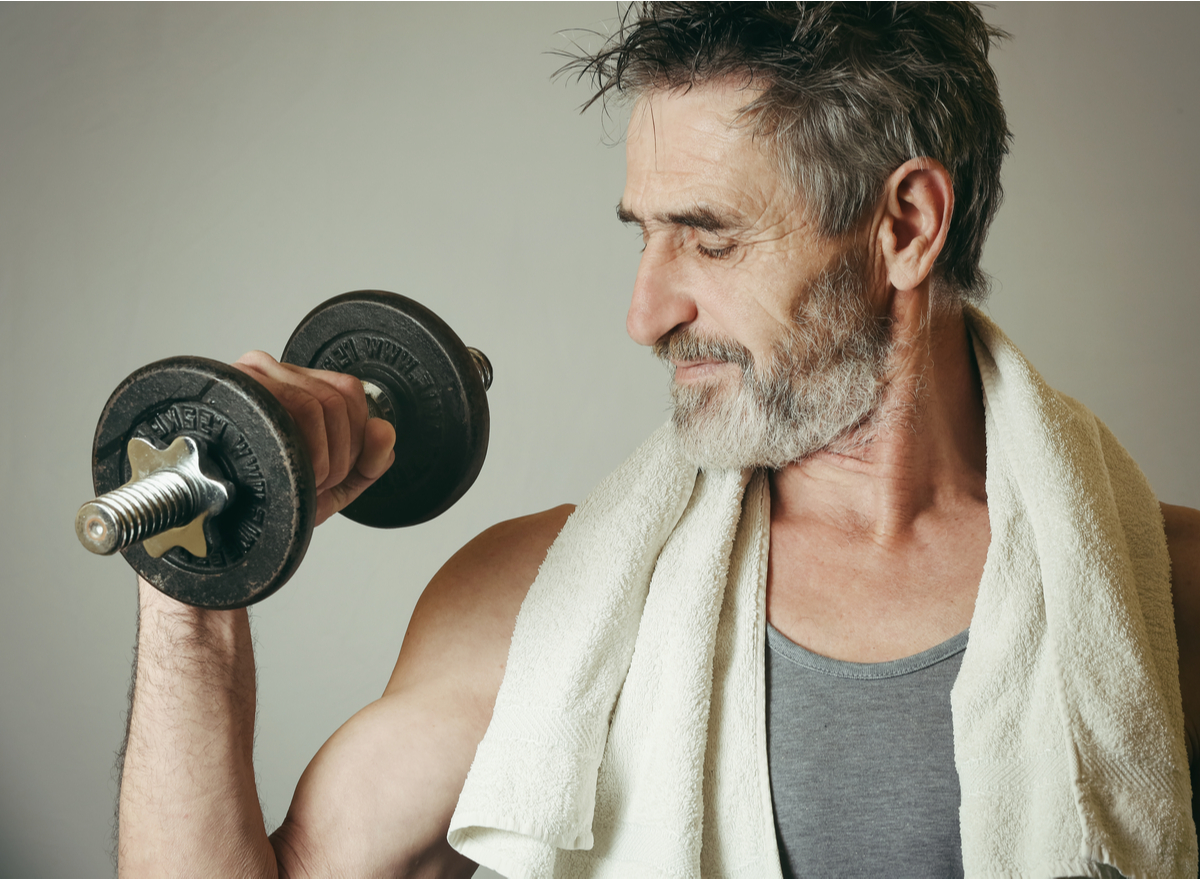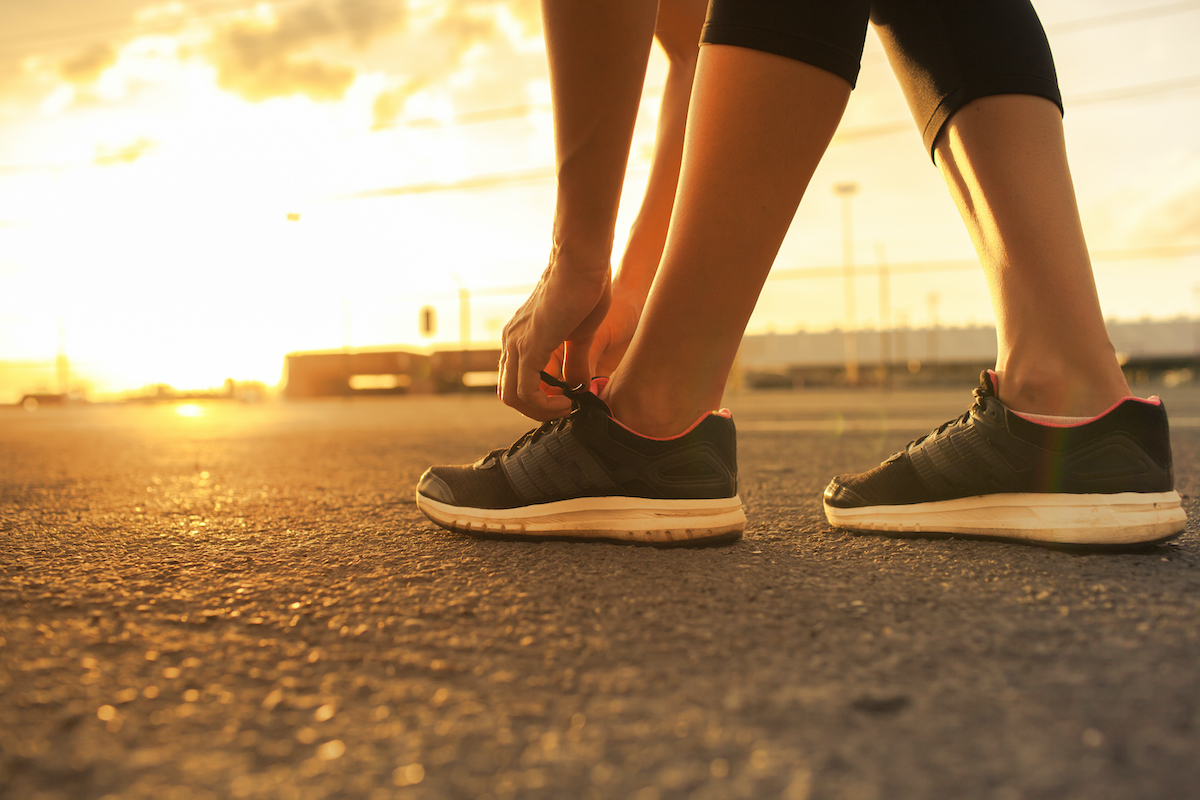5 Popular Exercise Habits You Should Skip After 60, Say Experts

If you're over 60 and exercise regularly, you're making the right choice! There's no shortage of benefits associated with consistent physical activity in old age: Stronger bones, less chronic pain, and a lower risk of chronic disease are just a few.
Even if you're already in great shape physically for your age, sticking with an exercise routine that works for you offers a world of mental benefits as well. One study published in the American Journal of Physiology tracked a group of men aged 65 and older during a 12-week exercise program and found that working out activated muscle-generated "mood-boosters" capable of fighting off depressive thoughts and promoting a positive attitude.
"Even individuals who are already metabolically healthy—with good weight, blood pressure, and blood sugar levels—need to prioritize regular physical activity to maintain or improve upon their mental health," says lead study author David Allison, Ph.D. "We have shown such benefits are still achievable in old age and further emphasize the importance of maintaining an active lifestyle."
So, there are no excuses: Everyone aged 60 and older should be getting in at least some exercise on a regular basis. That being said, it's so important for older adults to take some extra precautions before starting a new fitness regimen. According to Sarah Pelc Graca, CPT, founder of Strong With Sarah, older individuals should start slowly, listen to your body carefully, and consult with your doctor before hitting the gym. "Start with activities that are less than 10 minutes, slowly building up your duration of exercising, the intensity, and the number of weeks you're active," she explains. "If you're starting a new exercise routine, double-check with your doctor to get the green light for physical activity or if they have any recommendations for you based on knowledge about you and your personal health."
These tips are a good start, but there are a number of other mistakes older adults should avoid while exercising. Read on to learn more about the exercise habits you should skip after age 60. And for more, don't miss The #1 No-Equipment Workout for People Over 60.
Habit 1: Working out at night

Working out in the evening may appeal to all the night owls out there, but an intense exercise session before bed can end up wreaking havoc on your sleep cycles. This study published in the European Journal of Applied Physiology concludes that exercising before bedtime can delay sleep onset. In other words, it will take longer and be more difficult to fall asleep. Another report published in Sports Medicine reports that working out within an hour of bedtime can diminish both sleep quality and overall time spent asleep.
Lack of sleep can exacerbate a number of existing problems and risk factors already common in older adults, such as memory and cognition issues, high blood pressure, and an increased risk of stroke. Moreover, one research project published in Brain, Behavior, and Immunity discovered that as little as a single night of poor sleep is all it takes to stimulate a group of genes linked to the biological aging process. Exercise is supposed to keep us feeling young. Unfortunately, if your workouts are keeping you up all night, you may actually be aging faster!
Instead, schedule your exercise sessions for the AM. This study, published in the British Journal of Sports Medicine, found that morning exercise helps improve both cognition and memory among older adults for the remainder of the day.
Related: Sign up for our newsletter for the latest healthy living news.
Habit 2: Avoiding the weight room

Many older adults looking to exercise more are hesitant to head toward the weight room over injury fears. While it's certainly a good idea to understand one's bodily limitations, totally neglecting resistance exercises and weight lifting is a mistake.
"As we age, we lose bone density and are at more risk of fractures, so it may feel like we should not be exercising with heavy weight anymore. Actually, strength training is exactly what we should be doing as we age, as it will build strength in the muscles and the bones to reduce the risk of falling and fractures. Heavy weights shouldn't be avoided because they help us keep up our bone strength for everyday activities—think about it, when you pick up the dog or grandchildren, they weigh much more than those 3 lbs dumbbells," comments Khayla Golucke, certified Pilates instructor at Kaira Studios Pilates.
There's plenty of research to back up the notion that older adults should add some moderate weight lifting to their fitness routine. This study, published in the Journal of Bone and Mineral Research, found that adults over the age of 65 are much more likely to die from any cause if they have minimal muscle mass in their arms and legs. Another report published in Medicine and Science in Sports and Exercise reports that less than one hour of weightlifting per week is enough to reduce heart attack and stroke risk by 40-70%.
"I have worked with a ton of older patients and one habit that most of them have fallen into is being scared to lift heavy, or even moderately heavy. Strength training for this population is of utmost importance and I would argue that they benefit from strength training more than any age group across the lifespan! As we age we lose muscle mass. Strength training helps prevent this loss in muscle mass and keeps people over 60 independent and helps them achieve all their activities of daily living," adds Dr. Kellen Scantlebury DPT, CSCS, of Fit Club NY.
Related: Exercise Tests Every Fit Person Should Be Able to Pass
Habit 3: Going long periods without drinking water

Drinking enough water is non-negotiable at any age, but older adults are more susceptible to dehydration than younger people. This is especially true during exercise, and the worst part is many older adults may not even realize how thirsty they are during a workout. Per the Cleveland Clinic, the sense of thirst actually diminishes with old age.
Additionally, older adults naturally carry less water in their bodies. So even if someone used to finish a workout with no problem without much water years ago, they shouldn't make a habit of forgetting their water bottle past the age of 60.
"Adults over the age of 60 should make sure that they don't get dehydrated, especially during exercise. As you get older your sense of thirst isn't as strong as when you're younger, so it's common to not drink as much water as needed. This can cause issues with blood pressure, activity levels, and fatigue. It's important to drink water throughout the day to avoid this," explains Jeff Parke, owner of Top Fitness Magazine.
Related: Incredible Treadmill Workouts for People Over 60, Say Experts
Habit 4: Running long distances

Running is considered a pillar of fitness, but older adults need to be careful about incorporating strenuous runs into their routines. Why? When we run, it places major strain on joints and bones. That's no big deal when the body is young, but skeletal integrity and strength inevitably decline as we age. Moreover, osteoarthritis, defined as the breakdown of joint cartilage, is super common in older adults.
"Older adults should avoid going for long runs. While I love the idea of folks running well into their senior years, especially if it's a passion of theirs, the fact of the matter is that it's an incredibly jarring activity that bears tremendous stress on our joints. Hips, Knees, and ankles are all affected by the repetition of running. Over time, your joints slowly start to wear down, made even more evident by the natural process of aging which does the same thing. When your joints begin to wear down, you start feeling pain, discomfort, and you put yourself at risk for serious injury. If you really love running, try to limit the amount of it you do per week by either keeping your runs short or spacing them out enough so that your body has proper time to heal and recover," says Tami Smith, CPT, of Fit Healthy Mama.
Does this mean older adults shouldn't run at all? Not necessarily, but start slow and with short distances. It also may be advantageous to try running in the wilderness with some grass beneath your feet as opposed to unforgiving concrete.
"Vary your workout. Try to find a dirt trail to run on. Step off the path at the park and run in the grass. Running on softer surfaces like this will help in not jarring your spine with every footfall as much as running strictly on pavement can. You'll also benefit from getting stronger legs, as the softer ground gives more and requires more energy, strength, and effort to push forward on," suggests Neel Anand, MD, professor of orthopedic surgery and director of spine trauma at Cedars-Sinai Spine Center in Los Angeles.
Habit 5: Forgetting to walk every day

Walking may not always feel like exercise, but rest assured it is! A consistent walking schedule has been shown to promote a sharper mind, a longer lifespan, and a healthier heart!
Just in case all that isn't enough, walking can also provide a serious immune system boost for older adults. The human body's immune system naturally slows down as we age, becoming slower to detect and respond to threats. Walking, however, can help keep the immune system strong.
This study published in the British Journal of Sports Medicine tracked 1,000 participants during flu season. Those who regularly went for a walk reported fewer upper respiratory tract infections and 43% fewer days spent feeling sick in comparison to others who never went for a stroll. Additional research published in Medicine & Science in Sports & Exercise even found that just 30 minutes of walking produces a big increase in white blood cells, which are an integral part of strong immune functioning.
For more, check out The Secret Cult Walking Shoe That Doctors Are Obsessed With.








